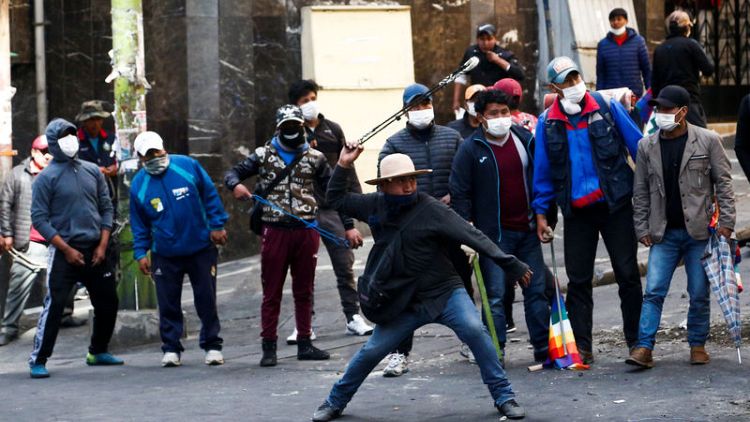By Daniel Ramos and Gram Slattery
LA PAZ (Reuters) - Bolivia's interim government said it had asked Venezuelan and Cuban officials to leave the country, including scores of Cuban doctors, accusing them of instigating unrest in the wake of the resignation of former president Evo Morales.
The foreign policy shake-up in Bolivia, outlined by the new foreign minister on Friday, comes as protests against the four-day-old government of conservative interim President Jeanine Anez roil the country amid its biggest political upheaval in over a decade.
Venezuela and Cuba were key allies for leftist Morales, who swept to office as the country's first indigenous president in 2006 and resigned under pressure on Sunday after weeks of protests and violence over a disputed Oct. 20 election.
The vote gave him an outright win but was tarnished by allegations of fraud, sparking widespread anti-government protests.
Morales and his vice president fled the country earlier this week, and were given asylum in Mexico. But protests by Morales' supporters have continued in capital La Paz, nearby El Alto, and the central city of Cochabamba, where hundreds have reportedly been detained in violent clashes.
Foreign Minister Karen Longaric said Cuba would fly home 725 of its citizens, mostly medical doctors, after she raised concerns about their alleged involvement in the recent unrest. She had also asked all Venezuelan diplomats to leave for similar reasons.
"There have been a number of accusations that Cuban citizens have been involved in these aggressive acts that have tormented our country in recent days," she said.
In a statement, Cuba's foreign ministry denied its doctors had supported any protests and said some had been attacked. Venezuela's foreign ministry did not immediately respond to requests for comments.
Other countries in the region, including Brazil and Ecuador, have acted similarly against Cubans in recent months.
The Caribbean island nation has a respected health service and generates export earnings by sending more than 50,000 health workers to more than 60 countries. Cuba has been accused of mistreating its doctors and pressuring them to take part in political activities, which the country denies.
Cuba and Venezuela have backed Morales' assertion that he was toppled in a foreign-backed coup.
Longaric said she had also met with the ambassador of Mexico to express dissatisfaction with the high-profile reception Morales was given in Mexico, which she said broke asylum rules.
At least 10 people have been killed in the protests since last month's vote, the public prosecutor's office said, mostly by firearms. Police fired teargas at protesters in La Paz on Friday, according to local media, as schools remained closed and fuel deliveries were disrupted by road blocks.
EVO RETURN?
Anez said on Friday that Morales was free to return to Bolivia, but would have to respond to allegations of electoral fraud and would not be immune from investigation.
Morales resigned after an Organization of American States audit found electoral irregularities and the military withdrew its backing and urged him to step down to help restore calm.
In the first sign of a potential breakthrough, lawmakers from Morales' party said they reached an agreement with the interim government late on Thursday to work toward a new presidential election.
Anez has said Morales could not be a candidate in that election.
"Nobody has thrown him out, but yes, there's a need for him to respond to accusations of electoral fraud, as well as many allegations of corruption," Anez told reporters at the presidential palace.
Morales told Reuters in an interview in Mexico on Friday that elections could be held without him. But no candidate from his Movement for Socialism (MAS) party has yet emerged to replace him.
Carlos Mesa, the leading challenger to Morales in October's disputed vote, urged Anez to schedule new elections by Sunday.
"It's very important that the international community and the country know she has set a date and time," Mesa was quoted as saying in an interview with Spanish newspaper El Pais.
(Reporting by Danny Ramos and Gram Slattery in La Paz, additional reporting by Sarah Marsh in Havana; Writing by Adam Jourdan and Mitra Taj; Editing by Dan Grebler and Rosalba O'Brien)
